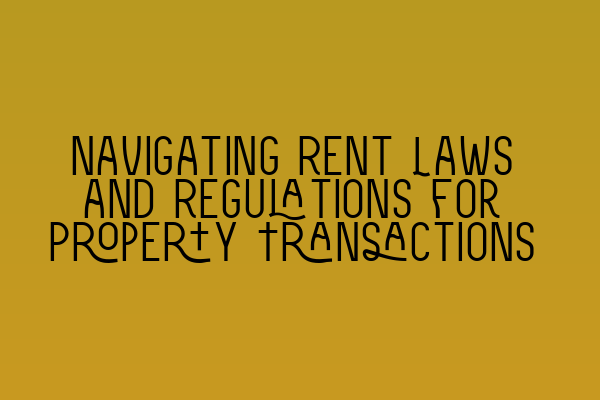Navigating Rent Laws and Regulations for Property Transactions
As a property owner or investor, it is crucial to have a clear understanding of rent laws and regulations to ensure a smooth and compliant property transaction. Rent laws play a significant role in both residential and commercial property dealings, providing guidelines for landlords and tenants alike. In this blog post, we will discuss key aspects of rent laws and regulations, arming you with the knowledge necessary to navigate these complexities successfully.
1. Differentiating between Residential and Commercial Rent Laws
Rent laws and regulations differ for residential and commercial properties. It is vital to understand the distinctions between the two to ensure adherence to the appropriate set of rules.
For residential properties, regulations typically address issues such as rent control, eviction procedures, security deposits, and property maintenance. On the other hand, commercial properties are governed by laws that focus on lease agreements, rent increases, and tenant rights. Familiarizing yourself with these distinctions will help you navigate the unique challenges posed by each type of property transaction.
2. Understanding Rent Control and Rent Stabilization
In some jurisdictions, residential properties may be subject to rent control or rent stabilization. Rent control laws limit the amount a landlord can charge for rent and the frequency of rent increases. Rent stabilization regulations, on the other hand, place restrictions on the magnitude of rent increases over a specified period.
Whether you are a landlord or a tenant, it is essential to be aware of the rent control or rent stabilization laws in your area. Consult with a legal professional to fully grasp the implications of these regulations and ensure compliance.
3. Familiarizing Yourself with Eviction Procedures
Evictions can be a complex and sensitive process. Both residential and commercial properties have specific rules and procedures that must be followed when seeking to evict a tenant. Understanding the legal requirements and timelines involved is crucial to avoid legal disputes or delays in regaining possession of your property.
Take the time to research and familiarize yourself with the eviction procedures in your jurisdiction. Seek legal advice if needed to ensure that you follow the proper steps and meet all the necessary conditions.
4. Navigating Security Deposit Regulations
Security deposits are a common component of residential property transactions. They serve to protect the landlord against potential damages or unpaid rent. However, there are laws in place that regulate the handling and return of security deposits.
Each jurisdiction has its own specific regulations regarding security deposits, including limits on the amount that can be collected, the timeframe for returning the deposit, and the requirements for documenting deductions. It is essential to understand these laws to avoid legal complications and potential disputes with tenants.
5. Complying with Property Maintenance Standards
Property maintenance is a shared responsibility between landlords and tenants. Failure to maintain a property in compliance with legal standards can lead to legal consequences and tarnish your reputation as a property owner.
Research the property maintenance regulations in your area, and ensure that you are meeting all the necessary requirements. Regular inspections and prompt repairs will not only keep you in compliance with the law but also contribute to a positive landlord-tenant relationship.
In conclusion, understanding and navigating rent laws and regulations is essential for a successful property transaction. By differentiating between residential and commercial rent laws, comprehending rent control and rent stabilization, familiarizing yourself with eviction procedures, navigating security deposit regulations, and complying with property maintenance standards, you can ensure a smooth and lawful property transaction.
For further resources and assistance in preparing for your property law exams, check out these related articles:
– SQE 1 Practice Exam Questions
– SQE 1 Practice Mocks FLK1 FLK2
– SQE 2 Preparation Courses
– SQE 1 Preparation Courses
– SRA SQE Exam Dates
Remember, it is always advisable to consult with a legal professional to address your specific circumstances and ensure compliance with rent laws and regulations.
